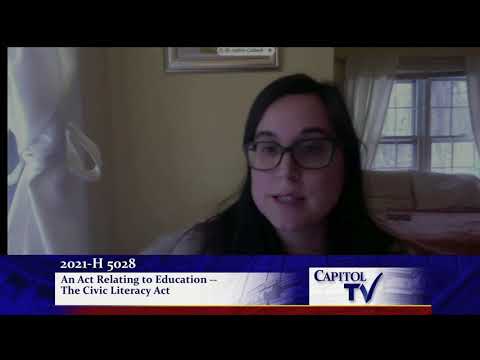Civic Literacy Act needs tweaks for diversity say advocates
“Unfortunately, as much as the ‘great endeavors of the “Founding Fathers”‘ are praised in American History classes, [this bill] lacks the call for diversity in the history of this country because, believe it or not, those ‘Founding Fathers’ did not build it by themselves.”
February 5, 2021, 5:02 pm
By Steve Ahlquist
The Rhode Island House Committee on Education heard testimony on the Civic Literacy Act, H5028, a bill that would all public school students between the eighth and twelfth grade to demonstrate proficiency in civics education. It’s an important bill, and one students have been pushing for for years, as Representative Marcia Ranglin-Vassell (Democrat, District 5, Providence) reminded the committee when she called out her former student Alita Cook, who sued the State of Rhode Island to enforce her right to a civics education.
It’s a popular bill and has bipartisan support. House Education Chair Joseph McNamara (Democrat, District 19, Warwick) noted during the hearing on the bill that there was no one testifying against it. In fact, the mere introduction of this bill has already some some positive effects on student engagement with government as much of the written testimony in favor of the bill came from students.
Despite this outpouring of support, the bill does require some fine tuning.
In written testimony, Galen Auer, Civic Advocacy Organizer for ARISE (Alliance of Rhode Island Southeast Asians for Education) writes that though their organization supports passage of the act, there are areas of concern.
“First, the bill lacks sufficient accountability measures,” writes Auer. “To ensure the transparency and effectiveness of rules and regulations put in place under the Civic Literacy Act, we recommend adding language requiring the Commissioner of Elementary and Secondary Education to seek input from students, community members and organizations in the process of developing this curriculum.
“Second, the bill lacks detail about the content of the proposed civic literacy curriculum. Specifically, we are concerned that the bill fails to address factors such as race, gender, and immigration status which have historically impacted, and continue to impact, the ability of all individuals to participate as equals in our democracy. The disproportionate focus of this bill on the role of foundational documents like the U.S. Constitution is reflective of a traditionalist approach to civic education, which does not adequately prepare students, especially students of color, with the skills to engage and effect change in their communities.
“We recommend that the Civic Literacy Act be amended to explicitly require lessons on the intersectionality of racism, sexism, and other forms of discrimination and marginalization, including how these factors impact civic knowledge and engagement.”
Kristina Pires and other activists with Generation Citizen, a national group supporting legislation to bring civics classes to students, testified along the same lines. “I want to advocate for the inclusion of… culturally responsive and equity centered civic learning that is really representative and relevant and promotes diverse voices, historical perspectives and draws on student’s lived experiences.”
ARISE Youth Organizer Samia Nash, a senior at Classical High School, nails it in her written testimony on the bill:
“From reading the bill, it is understood that students will be studying the history of fundamental documents, such as the Declaration of Independence, the U.S. Constitution, and the Rhode Island Constitution. It should be made clear in writing that just discussing the papers of this country does not meet the requirements of civic education. Unfortunately, as much as the ‘great endeavors of the “Founding Fathers”‘ are praised in American History classes, [this bill] lacks the call for diversity in the history of this country because, believe it or not, those ‘Founding Fathers’ did not build it by themselves.”
The addition of such language would be an easy fix and help to ensure the success of this important bill.







